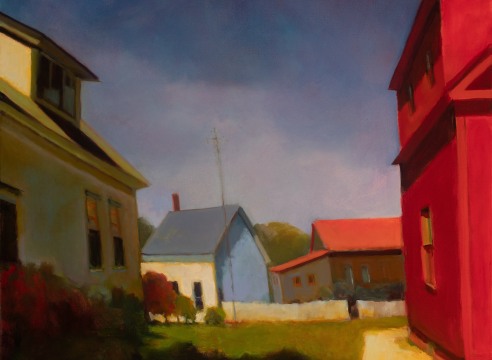
Connie Hayes will give a gallery talk in conjunction with this exhibition on Satruday, May 19th at 4pm
Windows
I fell in love with a barn last summer on the island of Vinalhaven. It has windows on three sides. The barn is large enough for a canoe, a ping-pong table, a laundry, a swing, kayaks, paddles, life jackets, a trampoline, an army of bicycles, visiting barn swallows, plus this last summer my ten painting students with all their easels and gear. The windows along the barn’s longest side poured light onto the chaos of tools and supplies on a wide shelf. After each day of painting, my students re-assembled their gear, creating a new arrangement of familiar objects.
The windows I live with at home were made in 1850 with very thin muntins. They are tall and some reach from floor to ceiling. They can collect condensation that makes scooping, frosty shapes that blur the view. The muntins make grid-segments that fracture the view. These features fascinate me in the way a subject can dissolve into patterns. The muntins sit in the flat plane of the glass, acting like a photograph to flatten the view.
If I did not paint, I would, one way or another, make things to satisfy my compulsion to select and arrange colors, shapes and forms. When struck by what I see, I respond in paint. I feel pulled by a subject that challenges me to translate that attraction into an illusion of space and light arising from my perception.
Painting satisfies my urge to explore color, trusting my unexplainable attraction to subjects. As can be read into dreams, windows suggest enclosure, safety, suffocation, order, containment, optimism, awakening, abundance, and even escape. I pay attention to paint more than to narration, in its astonishing, visceral effect separate from, but related to, what it depicts.
I cannot teach obsession, drive, determination, curiosity or attraction. Instead, I offer questions. Here are a few from courses I taught in Italy and on Vinalhaven during the past four years.
Are you painting a thing or an experience? What is the painting about? Does your work address a distilled idea or premise? Is your painting finished before it is complete? Can you separate pictorial from picturesque? Do you underappreciate the unintentional? Are you subverting what you know to discover what you see? Are you hoping a glass crowbar will help repeat earlier success? Is the geometry of your selection compelling and clear? Are you taking enough time to make decisions, or is your hand battery-operated? Do gimmicks or sentimentality displace sensations? Are you expecting linear improvement instead of discovery from the spiral of trial and error? Have you seen the motif as if it were already paint? Can you abandon control and then paint your way back? Can you paint it all, scrape it off to a ghost then re-position only what is essential? Are you using too much facility? Can you benefit from obstructing your virtuosity? Have you developed an overarching value structure to contain the temperature? Does your painting present a whole gesture? Are you squinting enough and utilizing the “indirect look”? Are you stuck in one area too long without hearing the alarms go off? Are you painting a non-mediated moment or are you using style or applied decision? Can you let things get ugly as you fight for the light? Can you make air precise? Have you staged a foil for a glow?
The asking of such questions fuels the challenge.
Connie Hayes
May 2018